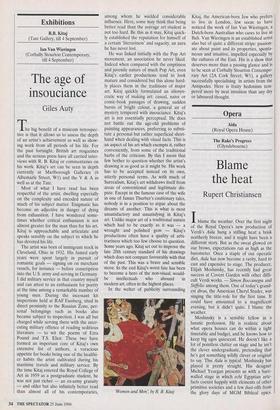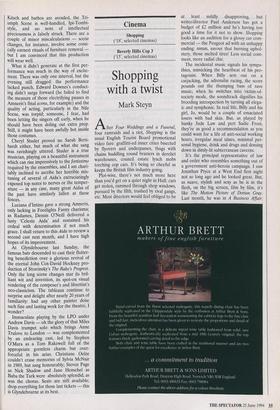Opera
Aida (Royal Opera House)
Blame the heat
Rupert Christiansen
Iblame the weather. Over the first night of the Royal Opera's new production of Verdi's Aida hung a stifling heat: a brisk northerly breeze, and it might have been a different story. But as the sweat glowed on our brows, expectations ran as high as the barometer. Once a staple of our operatic diet, Aida has now become a rarity, hard to cast and expensive to stage. The producer, Elijah Moshinsky, has recently had great success at Covent Garden with other diffi- cult Verdi works. — Simon Boccanegra and Stiffen° among them. One of today's grand- est divas, the American Cheryl Studer, was singing the title-role for the first time. It could have amounted to a magnificent evening, but it didn't quite. I blame the weather.
Moshinsky is a sensible fellow in a lunatic profession. He is realistic about what opera houses can do within a tight timetable and budget, and he knows how to keep big egos quiescent. He doesn't like a lot of pointless clutter on stage and he isn't the clever undergraduate, pretending that he's got something wildly clever or original to say. This Aida is typical: Moshinsky has played it pretty straight. His designer Michael Yeargan presents us with a bare- walled stage in which edit Egyptian arte- facts coexist happily with elements of other primitive societies and a few dust-offs from the glory days of MGM Biblical epics. Kitsch and bathos are avoided, the Tri umph Scene is well-handled, Ipi-Tombi- style, and no note of intellectual preciousness is falsely struck. There are a couple of minor miscalculations — scene changes, for instance, involve some comi- cally earnest rituals of furniture removal but I am convinced that this production will wear well.
What it didn't generate at the first per- formance was much in the way of excite- ment. There was only one interval, but the evening still dragged: the performance lacked punch. Edward Downes's conduct- ing didn't surge forward (he failed to find the measure of those electrifying pauses in Amneris's final scena, for example) and the quality of acting, particularly in the Nile Scene, was torpid; someone, I fear, had been letting the singers off early, when he should have been doling out extra prep. Still, it might have been awfully hot inside those costumes.
Cheryl Studer proved no Sarah Bern- hardt either, but much of what she sang was ravishingly uttered. Studer is a true musician, playing on a beautiful instrument which can rise impressively to the fortissimo required by the ensembles, and I am chari- tably inclined to ascribe her horrible mis- tuning of several of Aida's excruciatingly exposed top notes to nerves or the temper- ature — in any case, many great Aidas of the past have similarly fallen at these fences.
Luciana d'Intino gave a strong Amneris, only lacking in Footlights Fanny charisma; as Radames, Dennis O'Neill delivered a lusty 'Celeste Aida' and sustained his ordeal with determination if not much grace. I shall return to this Aida to review a second cast next month, and I have high hopes of its improvement. At Glyndeboume last Sunday, the famous bats descended to cast their flutter- ing benediction over a glorious revival of the eternal John Cox-David Hockney pro- duction of Stravinsky's The Rake's Progress. Only the long scene changes mar its bril- liant wit and invention, its spot-on visual rendering of the composer's and librettist's neo-classicism. The tableaux continue to surprise and delight after nearly 20 years of familiarity: had any other painter done such fine and lasting work for the theatre, I wonder?
Immaculate playing by the LPO under Andrew Davis — oh the glory of that Miles Davis trumpet solo which brings Anne Trulove to London — was complemented by an endearing cast, led by Stephen O'Mara as a Tom Rakewell full of the appropriate gormless charm but over- forceful in his arias. Christiane Oelze couldn't erase memories of Sylvia McNair in 1989, but sang honourably; Steven Page as Nick Shadow and Jane Henschel as Baba the Turk were absolutely splendid, as was the chorus. Seats are still available; drop everything for those last tickets — this is Glyndeboume at its best.

































































 Previous page
Previous page